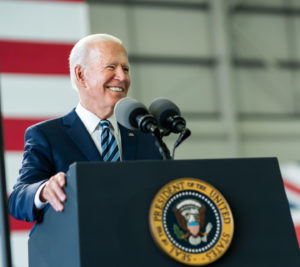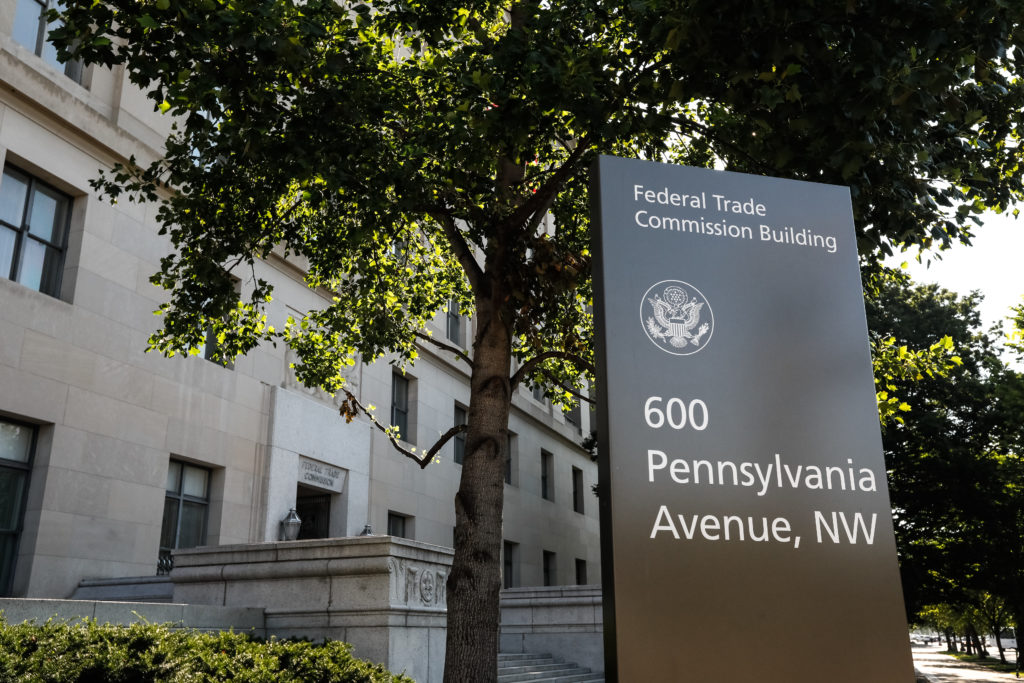
Biden order encourages FTC to consider rules on anticompetitive repair barriers
By onAnnouncements | Associations | Business Practices | Legal | Repair Operations
Democratic President Joe Biden on Friday “encouraged” the Federal Trade Commission chair to “consider” regulations on “unfair anticompetitive restrictions on third-party repair or self-repair of items.”
Assuming Chairwoman Lina Kahn and the rest of the FTC opt to move on this suggestion, the move could have ramifications for automakers and the aftermarket.
The CAR Coalition — whose members include the American Property Casualty Insurance Association, the Automotive Body Parts Association and LKQ — and Auto Care Association both celebrated Biden’s sentiment in news releases last week.
“The CAR Coalition applauds the Biden administration for putting consumers first in the vehicle repair process,” Car Coalition Executive Director Justin Rzepka said in a statement Friday. “This executive order will help expand choices for consumers and establish a more level playing field in the post-collision vehicle repair market. Competition breeds better service and more options. We look forward to working with the Biden administration on the implementation of this order. We also continue to urge Congress to address this important issue through legislation.”
Prior to the executive order Friday, the Auto Care Association praised the news that Biden planned to issue it.
“It is heartening to see that the right to repair efforts that Auto Care Association has been pressing for over the last two decades are now gaining traction in the Federal government,” association CEO Bill Hanvey said in a statement. “We urge the Administration and the FTC to take strong actions in order to reduce anti-competitive barriers to repair for our industry so that we can continue to service our customer’s vehicles.”
The CEO of the Alliance for Automotive Innovation, which represents nearly every major U.S. automaker, said the organization was “carefully reviewing this expansive Executive Order and its impact on the industry.”
“As it relates to ‘Right to Repair,’ the Federal Trade Commission’s May 2021 report, ‘Nixing the Fix,’ showed that when compared to other industries, automakers are the premier example of how to give consumers widely available options for repairing their products,” CEO John Bozella said in a statement Monday. “Today, vehicle owners have many repair options – from authorized dealer networks, to national chain service facilities, to independent repair shops, to even fixing the car themselves. This is because our members make parts, tools, training materials, and service information available to anyone, anywhere across the country.”
Industries on the hot seat
Biden didn’t mention the automotive industry specifically in the order, which suggests an FTC inspired by the document might be gunning for other sectors first before it turns its attention to automaker practices.
The key executive order repair passage holds:
(h) To address persistent and recurrent practices that inhibit competition, the Chair of the FTC, in the Chair’s discretion, is also encouraged to consider working with the rest of the Commission to exercise the FTC’s statutory rulemaking authority, as appropriate and consistent with applicable law, in areas such as:
(i) unfair data collection and surveillance practices that may damage competition, consumer autonomy, and consumer privacy;
(ii) unfair anticompetitive restrictions on third-party repair or self-repair of items, such as the restrictions imposed by powerful manufacturers that prevent farmers from repairing their own equipment;
Another section directs the secretary of defense to within 180 days “submit a report to the Chair of the White House Competition Council, on a plan for avoiding contract terms in procurement agreements that make it challenging or impossible for the Department of Defense or service members to repair their own equipment, particularly in the field.”
A White House fact sheet issued Friday also doesn’t mention automakers specifically. Phone and farm equipment manufacturers were in Biden’s crosshairs there.
“Corporate consolidation even affects farmers’ ability to repair their own equipment or to use independent repair shops,” the White House wrote. “Powerful equipment manufacturers—such as tractor manufacturers—use proprietary repair tools, software, and diagnostics to prevent third-parties from performing repairs. For example, when certain tractors detect a failure, they cease to operate until a dealer unlocks them. That forcers farmers to pay dealer rates for repairs that they could have made themselves, or that an independent repair shop could have done more cheaply.”
The fact sheet also highlights “Cell phone manufacturers and others blocking out independent repair shops: Tech and other companies impose restrictions on self and third-party repairs, making repairs more costly and time-consuming, such as by restricting the distribution of parts, diagnostics, and repair tools.” (Emphasis White House’s.)
In addition, automotive OEMs are actually on the government’s “nice” list.
As Bozella noted, the FTC report earlier this year presented the 2014 “right to repair” agreement struck by OEMs and the automotive aftermarket as a potential model for other, more restrictive industries, and the Auto Care Association pointed this out as well Thursday.
“Unlike many industries, the aftermarket has been fortunate to have made major progress in the right to repair efforts highlighted by the Memorandum of Understanding signed by Auto Care Association, the Coalition for Auto Repair Equality (CARE) and the vehicle manufacturers in 2014, and that ensure access to the repair information, tools and software needed to repair late model vehicles,” the association wrote.
Automaker repair practices scrutiny
But automakers and aftermarket repairers are still on the government’s radar nonetheless. The FTC’s repairability and competition report published earlier this year proved highly skeptical of manufacturer arguments — and highlighted criticism from Safelite, LKQ and the Auto Body Parts Association.
The FTC described LKQ attacking parts restricted to certified OEM repair networks and the potential for automakers to use telematics to “‘steer the consumer’” It also noted Safelite and the Auto Care Association’s opposition to automakers warning of risks from non-OEM parts.
We asked the White House specifically about OEM parts restrictions to certified networks, which raise an interesting competitiveness question. Did Biden view those as competitive so long as uncertified first-party dealerships couldn’t get the parts either? Or did he view the lack of universal parts access as anticompetitive regardless? The White House press office has not yet responded.
The FTC seemed to view restricted parts as anticompetitive in its May report.
“Some manufacturers make parts available only to their authorized repair networks,” the FTC wrote in its “Nixing the Fix” report to Congress, citing research from LKQ. “For example, LKQ Corporation (‘LKQ Corp.’) stated that in the automobile industry, where replacement parts have been generally available outside of manufacturers’ repair networks, several manufacturers, such as Volvo, limit the availability of key replacement parts to only their authorized repair networks.”
The FTC ultimately seemed skeptical about the cases for repairability restrictions advanced by various industries’ manufacturers.
It doesn’t appear that automakers weighed in formally when the FTC solicited comments in 2019, and the FTC’s references to manufacturer counterarguments below use those terms generically and summarize arguments which could have come from unrelated sectors like appliance makers.
LKQ argued in its comments to the FTC that Volvo could have restricted parts but “pursued an accreditation program open to all members of the repair community and not the select few that join the loyalty club.”
According to the FTC, manufacturers “argue that authorized repair facilities provide superior service compared to the service provided by independent repair facilities. Most of the support for this argument is anecdotal and relates to concerns about independent repair facilities that do not meet safety standards and do not conduct repairs properly.”
The agency said companies also “argue that repair restrictions protect repair workers and consumers from injuries that could result from fixing a product or using an improperly repaired product. According to manufacturers, safety risks are mitigated when repairs are performed by authorized repair persons …
“Manufacturers further assert that unauthorized repair presents a safety risk for a device’s user, not just its repairer.”
Groups push for alternative parts
The Auto Care Association and other trade groups are also lobbying the FTC on other OEM parts issues.
“Notwithstanding the progress, manufacturers continue to place barriers in the way of independent repair shops being able to service vehicles,” the Auto Care Association wrote Thursday.
“Ranging from car company OE parts marketing practices to access to in-vehicle data, independent repair shops and their suppliers continue to be challenged in providing repair maintenance for U.S. car owners. Many of these issues facing the vehicle aftermarket were outlined in the recent FTC report entitled ‘Nixing the Fix, a Report to Congress’. On June 30, the Auto Care Association, along with six other automotive aftermarket trade groups, sent a letter to the FTC calling for the Commission to take action to address concerns outlined in their report.
“The Auto Care Association will be meeting with FTC in the coming days to urge them to engage in a multi sector rulemaking to address right to repair issues across all industries, as well as those that might be more sector specific to the aftermarket.”
The other June 30 signatories included the CAR Coalition, Automotive Recyclers Association, SEMA, Tire Industry Association, Automotive Oil Change Association, Service Station Dealers of America and Allied Trades.
The group didn’t mention parts restrictions in their letter to Khan. Instead, they asked the agency to give customers greater disclosure of their ability to use alternative parts without voiding a warranty:
• Require OEMs/authorized dealers to provide written notice of (Magnusson Moss Warranty Act) rights at the time of any vehicle warranty repair denial and a written explanation of the evidence justifying warranty coverage denial.
• Require OEMs/authorized dealers to provide written notice of any maintenance or repair claimed to be required as a result of prior vehicle maintenance with an aftermarket part and/or done by an aftermarket service provider. This must be done prior to performing the maintenance or repair.
• Update FTC educational materials to note that consumers have the right to modify their vehicle and that warranty repairs may not be denied simply by the presence of a nonoriginal, recycled or specialty part. …
• Mandate that disclosure of MMWA rights be included with warranty information provided at the time of vehicle purchase in a clear and obvious manner. (Minor formatting edits.)
They also wanted OEMs to stop allegedly insinuating in owners manuals or in technical communications to repairers that OEM parts had to be used. The groups called upon the FTC to:
• Establish guidelines for an MMWA anti-tying compliance notice to be included in any communications between OEMs and franchised dealers regarding recommendations for use of any original equipment part or service, including maintenance and repair directives.
• Require manufacturers to include a disclosure in all repair procedures not covered by a warranty or recall that service providers are not required to use OEM parts and that they should consider all parts sourcing options when authorizing repairs. (Minor formatting edits.)
More information:
“Executive Order on Promoting Competition in the American Economy”
White House, July 9, 2021
“FACT SHEET: Executive Order on Promoting Competition in the American Economy”
White House, July 9, 2021
“Auto Care Association Comments on Biden Right to Repair Announcement”
Auto Care Association, July 6, 2021
“Nixing the Fix: An FTC Report to Congress on Repair Restrictions”
FTC, May 2021
Images:
Democratic President Joe Biden speaks June 9, 2021. (Adam Schultz/White House)
The Federal Trade Commission headquarters is seen July 19, 2019. (P_Wei/iStock)
The Federal Trade Commission headquarters is shown. (bpperry/iStock)


